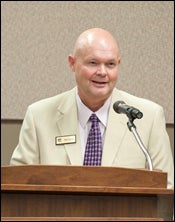ECU TUITION
Trustees say quality at issue
East Carolina University’s trustees face a changed landscape this year, the board’s chairman said, as they consider how much to ask students to pay for a college education.
“This is a much different situation than we have faced in the past as a board and as an administration,” said Robert Lucas, chairman, speaking Monday during the board’s first discussion of tuition and fee rates for the 2012-2013 academic year.
Four years of unprecedented state budget cuts have resulted in the loss of 180 sections of courses taught at ECU this year and eliminated about 200 positions. In addition, many areas of the university’s operations, from building maintenance to information technology, have been squeezed to their limits, Vice Chancellor for Administration and Finance Rick Niswander said.

ECU Board of Trustees Chairman Robert Lucas
(Photo by Cliff Hollis)
Those fiscal losses —along with continuing uncertainty about future funding — make maintaining the quality of an education at ECU more critical in tuition decisions this year than before, said Lucas and other trustees.
“I am becoming increasing concerned about the quality issues,” said trustee Ken Chalk. “I am concerned we are in some ways diminishing quality and we may need to use some of this catch-up money to preserve that quality.”
ECU administrators presented trustees with three proposals for increasing tuition in 2012-2013. The board will discuss those proposals in greater detail Dec. 1 and 2 at its regularly scheduled meeting and is expected to make a decision then. The UNC Board of Governors must also approve any increase.
Click here to read the details of the proposals presented to trustees, including how much money each would earmark for priorities, from student financial aid to discretionary money.
One proposal would raise in-state undergraduate tuition by 6.5 percent, the cap placed on annual campus-based tuition hikes by the University of North Carolina Board of Governors.
The other two proposals would raise in-state undergraduate tuition by 6.5 percent, then levy surcharges over the next three to four years — effectively increasing tuition by 10 and 12.5 percent, respectively, over time.
Those two options take advantage of “catch-up” increases being allowed this year by the UNC system for schools with significant unfunded needs whose rates are comparable with peer institutions.
Chancellor Steve Ballard said access and affordability have guided ECU toward modest tuition increases in past years. But absorbing a $49 million, 16.1 percent state budget cut this fiscal year — along with the prospect that next year, for the first time, no new state money will be coming to fund enrollment growth — has pushed the university to the tipping point with quality.
“We have been able to keep our thumbs in the dike for these four years,” Ballard said. “We can no longer do that. We must put some money into some things that keep the student experience excellent.”
The proposals presented to the board would:
- Earmark a minimum of 25 percent of any tuition increase for need-based financial aid.
- Earmark the remainder for merit-based financial aid, measures that enhance student learning, (such as hiring faculty to reinstate the 180 lost course sections) creating a salary increase pool for staff and faculty or offsetting future budget cuts.
Niswander told trustees ECU began work on these three proposals in June. The process included seeking feedback from students, faculty and staff, including two student forums on campus. The input is reflected in the proposals, he said.
Most schools in the UNC system are looking at tuition increases in the range of 10-12 percent, Niswander said, with many opting to raise rates incrementally. This month, UNC Chapel Hill increased undergraduate in-state tuition rates by 15.6 percent, spread over four years. N.C. State University trustees approved a 10.9 percent in-state undergraduate increase.
ECU administrators also asked trustees for permission to raise mandatory student fees by $95 in 2012-2013, a 5.2 percent hike. The money would pay for improvements in campus information technology infrastructure, athletics, career services and transit, among other things.